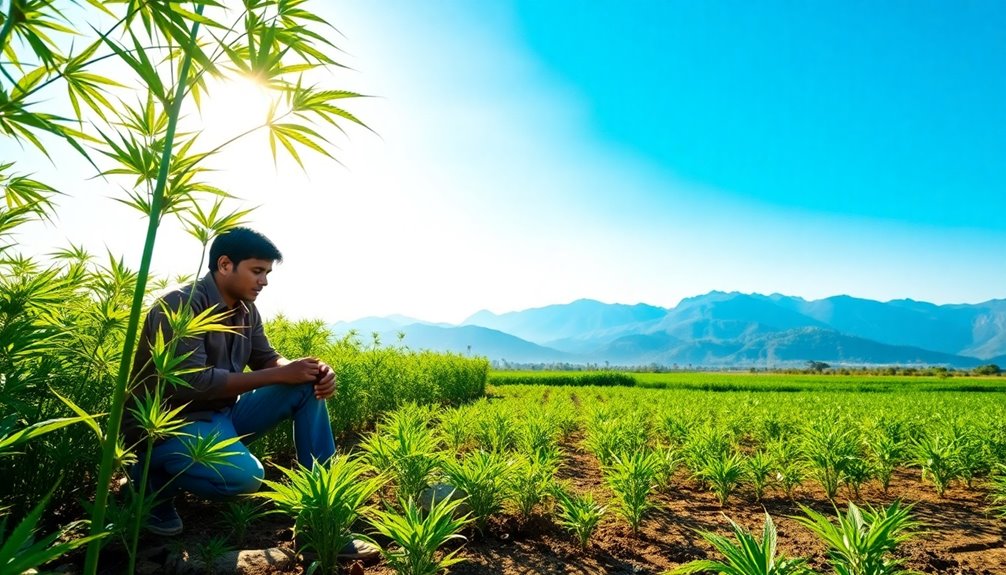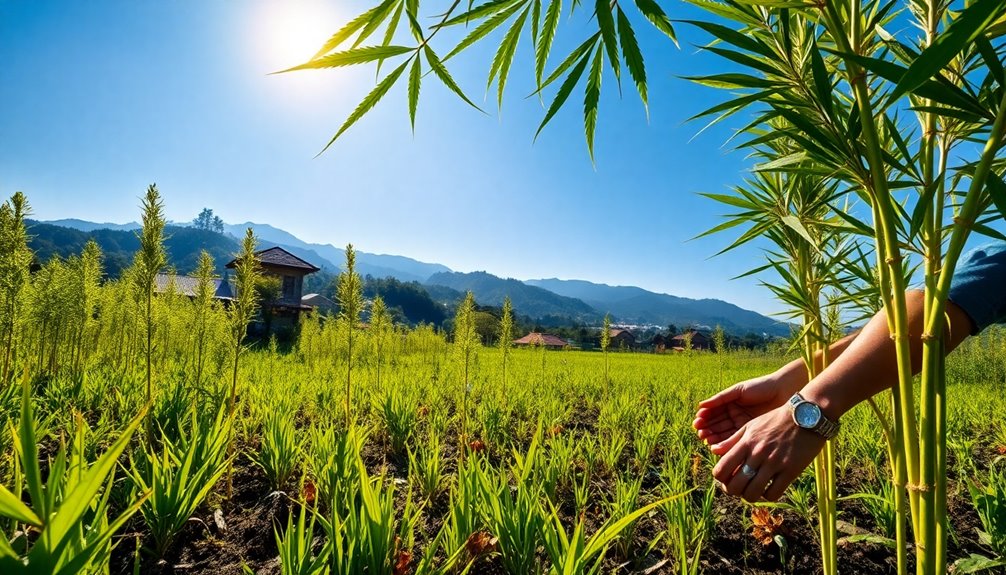Cultivating industrial hemp in Nepal offers you a fantastic opportunity for economic growth and sustainability. With a legal framework supporting its production, you can explore diverse markets, from textiles to eco-friendly products. Its environmental benefits, like improving soil health and combating erosion, make it a smart choice. Plus, there's a rising demand among the youth for hemp products. If you're interested in maximizing its potential, there's much more to discover about this promising sector.
Key Takeaways
- Cultivating industrial hemp offers economic opportunities, providing stable employment for rural farmers and boosting local businesses through exports.
- The legal framework around industrial hemp is evolving, clarifying regulations to support farmers and reduce confusion with marijuana.
- Hemp's environmental benefits, such as soil health improvement and drought resistance, make it a sustainable crop choice for challenging climates.
- Rising demand for hemp products, particularly among youth, presents opportunities for developing durable fabrics and superfood seeds.
- Utilizing traditional production techniques alongside modern methods can enhance the value of hemp and improve competitiveness against global markets.

As Nepal embraces the potential of industrial hemp, you'll find a unique intersection of tradition and innovation. The legal framework surrounding hemp cultivation is pivotal, classifying it as a medicinal herb rather than a narcotic. This distinction opens doors for regulated production and trade, although challenges persist. Authorities often confuse hemp with marijuana, leading to the destruction of crops, which hampers farmers' efforts.
Nepal's embrace of industrial hemp blends tradition with innovation, navigating legal challenges for sustainable growth and trade.
Yet, there's hope with evolving regulations aimed at clarifying legalities, fostering economic growth, and creating jobs. Camping locations can serve as inspiration for rural development, showcasing diverse ecosystems and opportunities for sustainable practices.
Hemp's environmental benefits are impressive, especially for Nepal's hilly terrain. Its deep root system combats soil erosion and enhances soil health. Plus, hemp's drought resistance means it can thrive even in challenging climates, making it an ideal crop for local farmers. The plant also excels in soil remediation, extracting heavy metals from contaminated areas. Additionally, industrial hemp in Nepal contains negligible THC, highlighting its suitability for eco-friendly products.
With its anti-bacterial properties, hemp products resist mold and fungus, further emphasizing its eco-friendly nature.
Production primarily occurs in western hill districts like Rolpa and Jumla, where traditional techniques shine. Locals skillfully boil hemp stems to separate fibers, weaving them into fabric on handlooms. However, competition from established exporters like China necessitates an efficient supply chain. Some manufacturers even import finer fibers from India to meet market demands.
Economically, industrial hemp presents a golden opportunity. Nepal exports raw hemp materials valued at around NRs 2 Arba 83 Crore annually, and cultivating hemp can create stable employment for rural farmers. Local businesses like Forestry Hemp Bag Udhyog are already making waves, exporting to over 70 countries.
The government recognizes these efforts, awarding successful entrepreneurs and encouraging market growth.
As the demand for hemp products, like durable fabrics and superfood seeds, rises among Nepali youth, the potential for cultivating and maximizing the value of industrial hemp in Nepal becomes increasingly clear. Your involvement in this burgeoning sector could contribute significantly to the local economy and environmental sustainability.
Frequently Asked Questions
What Are the Legal Requirements for Cultivating Industrial Hemp in Nepal?
To cultivate industrial hemp in Nepal, you won't need a license for certain products if they come from wild or domestically grown hemp, according to proposed regulations.
However, you'll have to adhere to a THC limit of 0.2%, which aligns with EU standards.
Currently, the legal framework is unclear, and there isn't a formal registration system for cultivation sites.
It's crucial to stay informed about potential legislative changes that could impact your efforts.
How Does Industrial Hemp Benefit Local Economies in Nepal?
You might think hemp farming is just another crop, but it's so much more.
By cultivating industrial hemp, you can boost local economies significantly. It creates jobs across various sectors, increases farmers' incomes, and diversifies the economy, reducing dependence on single industries.
As demand for hemp products rises, you'll see market expansion and opportunities for artisans, fostering rural development and empowering communities.
Embracing hemp can truly transform your local economy for the better.
What Environmental Impacts Does Industrial Hemp Cultivation Have in Nepal?
When you consider the environmental impacts of industrial hemp cultivation, you'll find several benefits.
Hemp absorbs significant CO₂, helping to lessen greenhouse gas emissions. It improves soil health by removing pollutants and requires minimal pesticides.
Plus, it's drought-resistant, needing less water than traditional crops. By supporting biodiversity and even cleaning contaminated soils, hemp can play a crucial role in promoting sustainable agricultural practices and enhancing the environment in your region.
Can Industrial Hemp Be Used for Biofuel Production in Nepal?
Imagine fueling your vehicle with a sustainable source grown right in your backyard. Yes, industrial hemp can indeed be used for biofuel production in Nepal!
With its ability to produce biodiesel and other fuels, hemp offers a cleaner alternative to fossil fuels. However, challenges like legal ambiguities and high production costs need addressing.
What Are the Market Trends for Hemp Products in Nepal?
You'll find that the market for hemp products in Nepal is booming, particularly eco-friendly bags. Prices range from Rs600 to Rs5,000, reflecting quality and size.
Consumers are increasingly drawn to sustainable options, driving exports to markets in the US and Europe.
However, challenges like mixed fibers and high transportation costs affect local production.
Still, the potential for job creation and environmental benefits makes this a promising industry for the future.
Conclusion
In conclusion, embracing industrial hemp in Nepal could transform the agricultural landscape and boost the economy. Did you know that hemp can produce up to four times more fiber per acre compared to cotton? By cultivating this versatile crop, Nepal can tap into a growing global market and create sustainable job opportunities. It's time to recognize hemp's potential and harness its benefits for a greener, more prosperous future for the nation.









